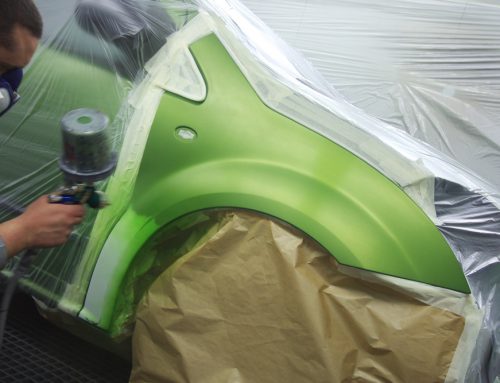Setting:
You operate a small collision shop with a great team of about ten skilled and enthusiastic employees. The workshop is running, business is good, there is no lack of work.
Everything is running quite smoothly … until one day you hit a snag. You learn that your only painter broke his wrist in a bicycle accident and will be out for several weeks.
What now?
With the current labour shortage, finding and hiring a quality replacement within a reasonable time frame is not easy. And you can’t put your workshop on hold for two weeks!
Better be safe than sorry. With the right plan in place, you can avoid running into this dead end.
We spoke to Timothee Loehn, who has successfully introduced cross-training in his workshop to face these challenges.
For the past year, Timothee has been Regional Manager for AutoCanada, a group that now has over 80 franchised dealerships and represents 28 brands across Canada and in Illinois, USA. Timothee oversees eight body shops in Eastern Canada, with four more to come this year.
Prior to that, he spent six years managing a Mercedes-Benz workshop on the South Shore of Montreal. He came to an already established team. Timothee made several changes (e.g., in terms of insurance partners and income source), but was soon faced with a shortage of staff and talents in the industry. Often with small teams, collision shops are constantly in a precarious situation, as a single absence can disrupt the entire production line. This is what ended up happening when his painter went on a week-long vacation.
Timothee realized that a multi-functional team was necessary for a shop to operate in a stable and consistent manner. His goal was to ensure that each employee could perform several different functions at the shop.
How did he go about it? He says: “For today’s generations, the best way to create engagement at work is to provide an opportunity for growth.” In this spirit, when his painter went on holiday, he proposed to a preparer, who had already shown some aptitude, to take his game to another level. In partnership with Axalta, he provided on-site training, supervised by the paint company representative. Obviously, a newly trained painter can’t be as good as a more experienced painter, but Timothee adds: “A good plan today is better than a perfect plan tomorrow.” It is better, he says, to slow down the pace, but maintain consistency in business operation rather than push things to the limit when you don’t have the staff.
Thanks to this approach, in a context where it is sometimes difficult for a workshop to have even one painter on hand, Timothee’s collision shop has three people who can take on this role. The same applies to those assigned to bodywork, reassembly, preparation, mechanics, finishing, etc. By distributing various roles among the team members, it becomes much simpler and more efficient to reorganize the tasks and continue the work in case of absences. It also allows to implement a rotation system where employees remain effective in their different roles.
This principle is not limited to the workshop: administration, liaison and appraisal staff can also be trained to fill in for each other when necessary.
In the Mercedes-Benz workshop, the carwash attendant also takes appraisal notes even before the appraiser arrives. Once the appraiser is done, they compare notes and confirm the appraisal together. This is another form of on-the-job training that can be adopted.
These practices have made Timothee’s workshop one of the most successful. Of course, newly trained employees must be paid what they are worth, but it is an investment that will benefit the entire company on many levels. As we have seen, the increased flexibility provided by cross-training facilitates work planning. With their expanded responsibilities, employees feel valued and committed to the success of the company. According to Timothee: “The fact that their talents are recognized creates a culture of performance, which drives each person to maximize their efficiency.” It is also a culture based on teamwork and complementarity between staff members.
Another important benefit of cross-training is that by taking on different roles, employees become more aware of what they offer the next department in the production line. Sharing tasks allows to naturally develop some form of quality control and continuous improvement in the company culture. It is sometimes said that a chain is only as strong as its weakest link. Cross-training ensures that every link in the chain is strengthened and almost impossible to break.
Finally, in terms of planning, a multi-functional team can better deal with bottlenecks. For example, if the painter is present, but a situation arises where a second painter would be useful, the flexibility of the staff will save a lot of time and maintain the production rate. Similarly, explains Timothee, mechanical work is often outsourced when there is a bottleneck in this area, but mechanically trained dent removers are a more cost-effective in-house solution, as they will be able to do the basic mechanical work on site. In his role as a supervisor at AutoCanada, Timothee wants to work with shop managers to help them see how training their employees to multitask brings value to their business.
It is often much easier to find people on your own shop floor who want to develop their careers and learn new skills, rather than trying to recruit qualified staff from outside. Timothee reminds us that workshop technicians are highly skilled manual workers who have a lot of potential to diversify.
In general, if you implement cross-training at your shop, you should ideally start by training a preparer to replace the painter, because the paint room, according to Timothee, is “the lungs of the workshop.”
But there is no single recipe, as each workshop has its own identity, its own configuration, its own dynamics, and its own specific challenges. Role distribution must therefore be rethought each time based on the personnel in place and the needs of the company. But maximizing the opportunities for cross-training with your team is certainly a smart investment, which will make you more flexible, more versatile and, by the same token, more profitable.
—
Author: Nelson Guilbert
Collaboration: Timothee Loehn, Charles Aubry, and Alexandre Rocheleau
Translator: Sophie Larocque
Editor: Émilie Blanchette





